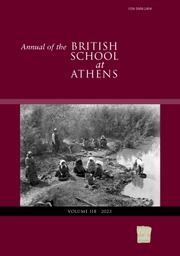Article contents
A Note on the θήλεα νοῦσος of the Skythians
Published online by Cambridge University Press: 18 October 2013
Extract
In a note on the Argive festival of the Hybristika I mentioned the diviners of Skythia as examples of that strange phenomenon familiar among many savage peoples, the magician who dresses as a woman. As the θήλεα νοῦσος has been somewhat of a crux to Herodotean scholars, I may perhaps be allowed to develop the point a little more at length.
It has usually been suggested that the θήλεα νοῦσος must be explained either as a vice, or as a bodily disease, or as a mental affliction. None of these theories, however, accounts for all the features of the evidence which we possess, and can only be tortured into conformity by the Procrustean ingenuity of the scholar. Those, for example, who explain the θήλεα νοῦσος as a vice, have further to show why those who are afflicted with it form a definite class, why they are connected especially with Askalon, and why they are magicians.
- Type
- Research Article
- Information
- Copyright
- Copyright © The Council, British School at Athens 1911
References
page 95 note 1 B.S.A. xvi. p. 214.
page 95 note 2 See Macan's note on Herodotos, iv. 67.
page 95 note 3 Anthropology and the Classics, pp. 137 foll.
page 97 note 1 Hippokrates, , περὶ ἀέρων, 22.Google Scholar The other passages which give the information stated are the following: οἴ δὲ ἐπείτε ἀναχωρέοντες ὀπίσω ἐγένοντο τῆς Συρίης ἐν ᾿Ασκάλωνι πόλι, τῶν πλεόνων  οἱ Σκύθαι (Herodotos, i. 105). οἱ δὲ ᾿Ενάρεες οἱ ἀνδρόγυνοι τὴν ᾿Αφροδίτην σφίσι λέγουσι μαντικὴν δοῦναι φιλύρης δ ὦν φλοιῷ μαντεύονται ἐπεὰν τὴν φιλύρην τρίχα σχίσῃ, διαπλέκων ἐντοῖσι δακτύ λοισι τοῖσι ἑωυτοῦ καὶ διαλύων χρᾶ (Herodotos, iv. 67). ἀλλ᾿ εἴ τις πρὸς ἆς οἱ πολλοὶ δύνανται ἀντέχειν, τούτων ἡττᾶται καὶμὴ δύναται ἀντιτείνειν, μὴ διὰ φύσιν τοῦ γένους ἤ διὰ νόσον, οἶον ἐν τοῖς Σκυθῶν βασιλεῦσιν ἡ μαλακία διὰ τὸ γένος καὶ ὡς τὸ θῆλυ πρὸς τὸ ἄρρεν διέστηκεν (Aristotle, , Eth. Nik. vii. 7Google Scholar).
οἱ Σκύθαι (Herodotos, i. 105). οἱ δὲ ᾿Ενάρεες οἱ ἀνδρόγυνοι τὴν ᾿Αφροδίτην σφίσι λέγουσι μαντικὴν δοῦναι φιλύρης δ ὦν φλοιῷ μαντεύονται ἐπεὰν τὴν φιλύρην τρίχα σχίσῃ, διαπλέκων ἐντοῖσι δακτύ λοισι τοῖσι ἑωυτοῦ καὶ διαλύων χρᾶ (Herodotos, iv. 67). ἀλλ᾿ εἴ τις πρὸς ἆς οἱ πολλοὶ δύνανται ἀντέχειν, τούτων ἡττᾶται καὶμὴ δύναται ἀντιτείνειν, μὴ διὰ φύσιν τοῦ γένους ἤ διὰ νόσον, οἶον ἐν τοῖς Σκυθῶν βασιλεῦσιν ἡ μαλακία διὰ τὸ γένος καὶ ὡς τὸ θῆλυ πρὸς τὸ ἄρρεν διέστηκεν (Aristotle, , Eth. Nik. vii. 7Google Scholar).
page 97 note 2 Frazer, , Adonis, Attis, and Osiris, Appendix IV. pp. 430 foll.Google Scholar; cf. Kroeber, , The Arapaho, Bulletin of the American Museum of Natural History, xviii. p. 19.Google Scholar
page 97 note 3 Bogoras, , The Chukchi of North-Eastern Asia, American Anthropologist, N.S. iii. p. 98.Google Scholar He adds: ‘Such full transformations are not numerous. In a tribe of 2000 men I heard of only five cases.’
page 97 note 4 E.g. the Sauks of North America or the devotees of the Indian goddess Huligamma. Frazer, op. cit. pp. 430, 225.
page 97 note 5 Frazer, op. cit. p. 225.
page 97 note 6 Bogoras, loc. cit.: ‘Instances of partial transformation, whereby the men, assuming female clothing and speech, can still have a wife and beget children are more numerous’ (among the Chukchi).
page 98 note 1 Frazer, op. cit. p. 428.
page 98 note 2 Frazer, op. cit. p. 30.
page 98 note 3 Herodotos, i. 105.
page 98 note 4 Lucian, , de dea Syria, 14.Google Scholar
page 98 note 5 Frazer, op. cit. p. 225; Lucian, , de dea Syria, 27.Google Scholar
page 98 note 6 Eusebius, , Vita Constantini, iii. 55Google Scholar, quoted Frazer, op. cit. p. 64.
page 99 note 1 Herodotos, iv. 59.
page 99 note 2 Lucian, , de dea Syria, 31.Google Scholar
page 100 note 1 Frazer, op. cit. pp. 235–236.
page 100 note 2 Herodotos, iv. 59.
page 100 note 3 Frazer, op. cit. p. 431.
page 101 note 1 Herodotos, iv. 68, speaks of βασιλεὺς ὁ σκυθέων apparently meaning chief of the Royal Skythians.
page 101 note 2 Hippokrates, loc. cit.
page 101 note 3 Herodotos, iv. 20.
page 101 note 4 Strabo, 311.
page 101 note 5 Herodotos, iv. 17–18.
- 1
- Cited by




